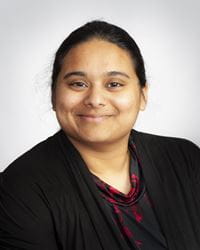Password Reset
Forgot your password? Enter the email address you used to create your account to initiate a password reset.
Forgot your password? Enter the email address you used to create your account to initiate a password reset.
The Division of Pediatric Endocrinology at UPMC Children’s Hospital of Pittsburgh is pleased to welcome its newest faculty member, Bianca M. Pinto, MD, FAAP. Dr. Pinto is currently finishing her last year of fellowship training in the Division and will officially join the Division as an assistant professor of pediatrics on September 1.
 Dr. Pinto earned her medical degree from the University of Central Florida College of Medicine, and completed her residency training at the University of Florida College of Medicine - Jacksonville prior to arriving at UPMC Children's and the University of Pittsburgh School of Medicine to conduct her pediatric endocrinology fellowship.
Dr. Pinto earned her medical degree from the University of Central Florida College of Medicine, and completed her residency training at the University of Florida College of Medicine - Jacksonville prior to arriving at UPMC Children's and the University of Pittsburgh School of Medicine to conduct her pediatric endocrinology fellowship.
Dr. Pinto's primary clinical and research priorities involve improving the quality of life and overall health of gender-diverse children and adolescents. Dr. Pinto's clinical work will focus mainly on general pediatric endocrinology, emphasizing pediatric diabetes and her continuing work with transgender and gender non-conforming youth in the Gender and Sexual Development Program.
During her pediatric endocrinology fellowship, Dr. Pinto was mentored by Selma F. Witchel, MD, fellowship director and chair of the Disorders of Sex Development Committee at UPMC Children’s, to further pursue her career and research interests: improving the quality of life and overall health of gender diverse youth.
Dr. Pinto’s primary research project in her fellowship focused on the school environment and academic outcomes of gender-diverse youth. The initial phase of the project involved a review of the gender diverse youth currently followed in the Division through the Gender and Sexual Development Program in Adolescent and Young Adult Medicine Division to determine the proportion of students who choose online or cyber school programs versus traditional schooling, and to identify the factors that may influence school choice, as well as evaluate the academic outcomes in this patient population. Among other findings, the study identified two characteristics associated with online school enrollment by gender-diverse youth: a previous history of bullying and poor grades.
Dr. Pinto and colleagues are currently working on a manuscript of the findings of the study. Preliminary findings have been presented at three national and international meetings: the Pediatric Endocrine Society annual meeting in 2020 and 2021, and the World Professional Association of Transgender Health in 2020.
Additionally, Dr. Pinto is currently researching the effects of gender-affirming treatments on aspects of the metabolic and bone health of gender-diverse youth. While some general guidelines exist on care and screening protocols for bone and metabolic health, it is an evolving clinical landscape that currently lacks evidence and consensus within the field. Dr. Pinto's work examines whether or not patients are currently being screened for bone and metabolic health at the level or frequency recommended by current guidelines and whether or not these screenings are efficacious in terms of health outcomes and cost-effectiveness. In an associated project, Dr. Pinto is studying the effects of gender-affirming treatments on the microbiome of the gut and its downstream effects. The study is obtaining samples prior to and after the initiation of hormone therapy to better understand how exogenous hormone exposures (estrogen and testosterone, respectively) affect the microbiome of the gut.
"There is not much research in this area right now concerning transgender and gender non-conforming children and adolescents. It is a relatively new and emerging field that is rapidly evolving. We are also dealing with an underserved patient population with numerous issues related to health care disparities that we have to work to overcome,” says Dr. Pinto. "I am looking forward to continuing my work at UPMC Children’s and help improve the health and social care of a particularly vulnerable patient population.”